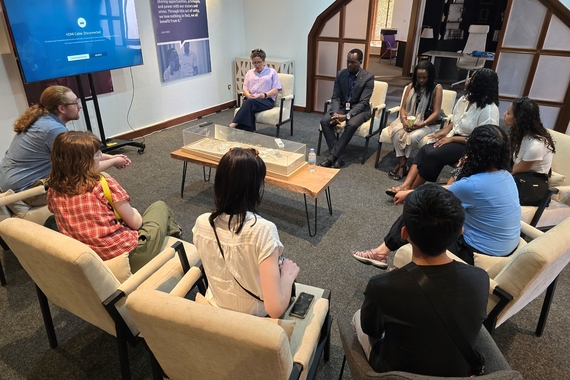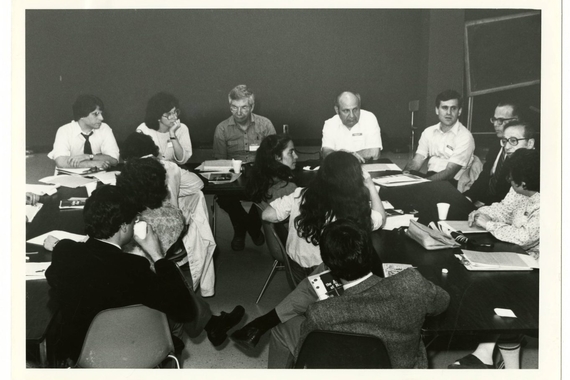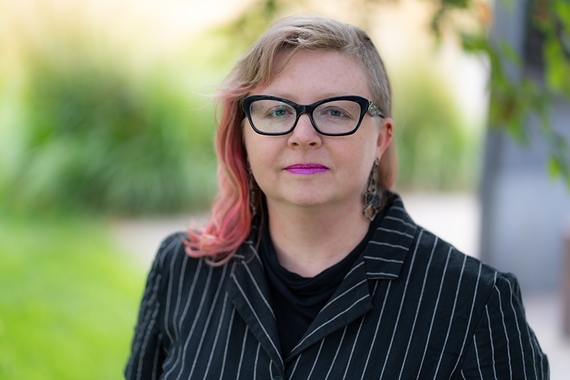Bridges of Memory: Connecting Communities and Classrooms
Join us for a series of community dialogues and virtual educator workshops to learn about genocides from the experiences and perspectives of local survivors and survivor communities. Topics will include the Armenian Genocide, Holodomor, Holocaust, and Cambodian Genocide, as well as a focus on how individuals and communities share stories of loss and survival, navigate trauma, memorialize victims, preserve and celebrate culture, and educate younger generations. Each of the four sessions, offered in partnership with a community organization, will feature a moderated conversation with a member of a survivor community followed by a question and answer session with participants. The series will conclude with three workshops specifically aimed at educators to discuss teaching about difficult histories and navigate trauma in school and community education settings.
Though we encourage you to join us for the complete series of talks, each session will be a stand-alone conversation, and the discussions will be recorded and made available online. All sessions are free and open to any interested participants. CEUs will be available for educators. See the session schedule below for more information and registration links. For more information, contact George Dalbo, Educational Outreach Coordinator for the Center for Holocaust and Genocide Studies, at dalbo006@umn.edu.
Community Dialogues
The Holocaust
(Presented in partnership with CHAIM (Children of Holocaust Survivors Association in Minnesota) and the Jewish Community Relations Council of Minnesota and the Dakotas)
- Speaker: Demetrios Vital and Ken Engel
- Date: Monday, June 22, 2020
- Time: 7:00-8:30 pm (CDT)
- Registration Link: Click Here
- Password: chgs22
-------------------------------------------------------
Cambodian Genocide
(Presented in partnership with IKARE and the Khmer Legacy Museum: Minnesota)
- Speaker: Kosol Sek
- Date: Tuesday, June 23, 2020
- Time: 7:00-8:30 pm (CDT)
- Registration Link: Click Here
- Password: chgs23
-------------------------------------------------------
Armenian Genocide
(Presented in partnership with St. Sahag Armenian Church: St. Paul, MN)
- Speaker: Rev. Fr. Tadeos Barseghyan
- Date: Monday, June 29, 2020
- Time: 7:00-8:30 pm (CDT)
- Registration Link: Click Here
- Password: chgs29
-------------------------------------------------------
Holodomor
(Presented in partnership with the Ukrainian American Community Center: Minneapolis, MN)
- Speakers: Luda Anastazievsky and Stefan Iwaskewycz
- Date: Tuesday, June 30, 2020
- Time: 7:00-8:30 pm (CDT)
- Registration Link: Click Here
- Password: chgs30
Educator Workshops
Dear My Teacher: Letter of Joy, Pain, and Triumph from Today’s Teenage Hmong Students - A Presentation and Discussion for Educators
(Presented in partnership with Hmong Educational Resource (HER) Publishers)
- Presenter: Pang Yang
- Date: Monday, July 6, 2020
- Time: 2:00-3:30 pm (CDT)
- Registration Link: Click Here
- Password: chgs06
This session will introduce participants to Pang Yang and Mike Vang’s (2019) Dear My Teacher: Letter of Joy, Pain, and Triumph from Today’s Teenage Hmong Students. The book includes a series of honest, sincere, and heartfelt letters from Hmong youth enrolled in the Hmong for Native Speakers classes at Park Center High School and Osseo Senior High School in the Osseo Area School District. Caught between two worlds, these students' letters share perspectives on intersections of education, race, and the Hmong experience in Minnesota. Though the letters range from humorous to heart-wrenching, they are grounded in the lived experiences of these marginalized young people. Pang, a veteran teacher, will discuss the letter, the overall project, and the publishing process. This talk is open to all but is explicitly aimed at pre-service and practicing educators. To purchase a copy of the book, visit the Hmong Educational Resources Publisher.
-------------------------------------------------------
Navigating Difficult Histories and Difficult Knowledge in Education: A Workshop for Educators
- Facilitators: George Dalbo, Joe Eggers, and Demetrios Vital
- Date: Tuesday, July 7, 2020
- Time: 7:00-8:30 pm
- Registration Link: Click Here
- Password: chgs07
This discussion-based session will examine research and strategies for teaching about difficult histories and difficult knowledge in K-16 classrooms, especially navigating discussions of genocide and mass violence. Participants will come away with strategies and resources. 1.5 CEUs available.
-------------------------------------------------------
Navigating Trauma in Education: A Workshop for Educators
- Facilitators: George Dalbo, Joe Eggers, and Demetrios Vital
- Date: Wednesday, July 8, 2020
- Time: 7:00-8:30 pm
- Registration Link: Click Here
- Password: chgs08
This discussion-based session will examine research and strategies for navigating trauma within the classroom, especially the trauma inherent in learning about genocide and mass violence. Participants will come away with strategies and resources. 1.5 CEUs available.
Speaker/Facilitator Biographies
Luda Anastazievsky is the Chair of the MN Ukrainian American Advocacy Committee, which represents over 14,000 Ukrainians in Minnesota. The Advocacy Committee, working in conjunction with national Ukrainian-American organizations, seeks to amplify the voices of Ukrainians in Minnesota and build support for Ukrainian issues in Minnesota and nationally. As Programming Director for the Ukrainian American Community Center, Luda's goals are to promote Ukrainian culture, history and current events, with a special focus on building awareness of the Ukrainian Genocide, Holodomor. Luda has successfully collaborated with the Ukrainian Embassy in Washington DC, the Ukrainian Consulate in Chicago, Ukrainian Congress Committee of America, Ukrainian National Women's League of America, and many Minnesota non-profit organizations to achieve those goals. Luda’s articles on the Minnesota Ukrainian community have been featured in Kyiv Post, the leading English language newspaper in Ukraine, the Ukrainian Weekly, an English language Ukrainian newspaper in the United States, and Ukrainian People Magazine, the leading Ukrainian language magazine in the USA. A Minneapolis Public Schools educator with over 27 years of experience, Luda successfully taught English and literacy skills to hundreds of immigrant students. In 2015, Luda was nominated for Minnesota Teacher of the Year for her demonstrated achievement in producing outstanding student outcomes and applying equitable instructional strategies to address disparities in academic achievement among diverse student groups. In 2018, Marcy Open School EL program, led by Luda for 10 years, was ranked in the top 5th percentile of all Minnesota schools demonstrating highest student growth for three years in a row. Luda holds an MA in Language Arts and MN state K-12 licenses in English as a Second Language and Literacy Education. A native of Ukraine, Luda is fluent in 4 languages.
Rev. Fr. Tadeos Barseghyan was born in Etchmiadzin, Armenia. Fr. Tadeos graduated from Gevorkian Theological Seminary (University) with bachelor’s and master’s degrees in theology. He was ordained to the holy priesthood in 2009, In 2011 Fr. Tadeos was assigned to serve at the Eastern Diocese of the Armenian Church of America, and, in 2012, Fr. Tadeos was assigned as the pastor of St. Sahag Church of St. Paul, MN. In 2016, Fr. Tadeos graduated from the University of St. Thomas with a master’s degree in the field of theology.
George Dalbo is the Educational Outreach Coordinator for the Center for Holocaust and Genocide Studies and a Ph.D. student in Social Studies Education at the University of Minnesota with research interests in Holocaust, genocide, and human rights education. Previously, he was a middle and high school social studies teacher, having taught every grade from 5th-12th in public, charter, and independent schools in Minnesota, as well as two years at an international school in Vienna, Austria.
Ken Engel's parents survived the Holocaust. As a member of the Speakers Bureau of the Jewish Community Relations Council of Minnesota and the Dakotas/Tolerance Minnesota, the JCRC Middle East Speakers Bureau, and other platforms, he's given hundreds of presentations to school, college, municipal, synagogue, church, educator, industry, business and private groups, clubs and organizations about the Holocaust, his parents' experiences during World War II, Israel, Judaism, and related subjects. He's trained thousands of survivors, children and grandchildren of survivors, community activists and lay members on how to effectively and comfortably share their individual stories with a wide range of audiences. Ken is Chair of CHAIM, a Minneapolis-St. Paul metropolitan area group of children (second generation, a.k.a 2Gs), grandchildren (3Gs), and other descendants and friends of Holocaust survivors. He also is a member of the governing Coordinating Council of Generations of the Shoah International (GSI), a U.S.-based group of Jewish leaders of Second Generation and other Holocaust-related organizations. GSI networks and shares information and resources on the Holocaust and related issues with Holocaust survivor families, organizations and institutions worldwide via GSI's monthly e-newsletter and on GSI's website, www.genshoah.org. GSI also advocates for the interests of survivors. GSI has more than 25,000 members on six continents and is the largest Holocaust survivor family organization in the world. His close, long-term participation in GSI -- which has included speaker training and conducting educational efforts across the U.S. -- has also helped make him a more effective speaker on these subjects. An attorney in private practice in downtown Minneapolis, he and his sweet wife live in Minneapolis' Bryn Mawr neighborhood, and recently welcomed their first two grandchildren, a beautiful boy, Quinn, and beautiful girl, Lillie.
Joe Eggers is the Research and Outreach Coordinator for the Center for Holocaust and Genocide Studies at the University of Minnesota. His research focuses on the forced assimilation policies towards Native communities in the United States. He is interested in expanding our concept of what constitutes genocide.
Stefan Iwaskewycz is the grandson of a Holodomor survivor and a recent participant in an oral history project entitled, “Holodomor Impact on Minnesota’s Ukrainian Community.” Stefan is active in local Ukrainian community life, having served on the board of directors of the Ukrainian American Community Center, Maidan MN, and the Ukrainian Heritage Festival. He studied history and cultural studies at the University of Minnesota and worked as an undergraduate research assistant at the Center for Holocaust and Genocide Studies. Stefan lived in Ukraine in 2004, during which time he was a firsthand observer of and participant in the Orange Revolution. He’s recently started work on a manuscript about his family’s history - part oral history, part memoir. As the drummer in the Twin Cities premier Ukrainian wedding band, the Ukrainian Village Band, Stefan enjoys sharing his Ukrainian heritage with a wide Twin Cities community.
Kosol Sek is the Managing Director of IKARE (The International Khmer Assembly) and the Khmer Legacy Museum. Kosol is a frequent guest on Voice of America (VOA), Radio Free Asia (RFA), Minnesota and National Public Radio, and has been featured on Fox TV, Phnom Penh Post, Cambodia Daily, and other publications throughout the world - Often discussing topics on how to protect, preserve, and promote the arts, history, culture, and future of the Khmer people.
Nikoleta Sremac is a sociology Ph.D. student at the University of Minnesota. She studies gendered power relations in post-conflict countries, including her native Balkans.
Demetrios Vital is part of the teaching team at the IDEAL Center of the Science Museum of Minnesota. The IDEAL Center’s professional development work is grounded in research on diversity and inclusion, transformative learning, and growing equitable relationships, to work towards a positive vision of our world. In his current work at the IDEAL Center, Demetrios brings this background forward by examining how we teach and learn in a post-Holocaust society, working to heal relationships and build a more equitable world. Previously, Demetrios worked at CHGS as outreach coordinator and museum associate.
Pang Yang is a Hmong for Native Speakers teacher at Park Center Senior High in the Osseo Area Schools. Three years ago, Yang was a leader in creating the Hmong for Native Speakers program, which has grown to more than 300 participants at Park Center and Osseo senior high schools. Yang has spent nearly 20 years teaching English as a second language and saw an opportunity to infuse Hmong culture and language into a stand-alone course. By creating a classroom where Hmong culture is central to the learning, Yang makes the material more relevant to her students. Learn more about Yang and how to develop a culturally relevant classroom in this MPR news story.
Community Partners
Center for Holocaust and Genocide Studies (CHGS): The Center for Holocaust and Genocide Studies at the University of Minnesota promotes academic research, education, and public awareness on the Holocaust, other genocides, and current forms of mass violence. We provide premier academic programs, fostering a community of students studying genocide and mass violence while cultivating the essential connection between scholarly inquiry, education, and outreach to different sectors of society. Our work is motivated by the hope to inspire future generations to fight hatred and strengthen democracy, thus ensuring a more peaceful and just world.
Children of Holocaust Survivors Association in Minnesota (CHAIM): CHAIM is a Minneapolis-St. Paul metropolitan area group of children (second generation, a.k.a 2Gs) and other descendants and friends of Holocaust survivors. We are linked together by the common goals of preserving and honoring our legacy and the legacy of our parents and other family members affected by the Holocaust, tackling issues of mutual interest, sharing resources and programming ideas, providing emotional support for our members, and reaching out to future generations — grandchildren (3Gs) and great-grandchildren (4Gs) of survivors. We meet approximately every other month and offer programs dedicated to remembrance of the Holocaust and to supporting the needs of descendants of survivors. These programs include guest speakers on topics of interest, educational and social action projects, documentaries about the Holocaust, and personal stories shared by our members about the 2G and 3G experience. There is no fee charged to belong to CHAIM. CHAIM is affiliated with 2G and 3G groups throughout the world, and with the worldwide umbrella group, Generations of the Shoah International (GSI), the world’s largest Holocaust family organization.
Hmong Educational Resources (HER) Publisher believes in the power of education and the impact of stories. We are an independent publisher of books about Hmong people, culture, and life experiences. HER is a one of a kind publishing company that provides services for Hmong students, writers, educators, researchers, and graphic artists. Through copy editing, design, and mentorship, we work with our authors and artists every step of the way, to translate their stories from the visionary to a physical book. We publish books in a wide range of categories and formats, fiction and non-fiction, and for audiences of all ages and educational backgrounds. We are always looking for new manuscripts and authors to work with.
The International Khmer Assembly (IKARE): The International Khmer Assembly, Inc was established in March 2012 as a project to advocate for the recognition of the Khmer and Southeast Asian Veterans for their role in defending American armed forces in the "secret war" of Southeast Asia. The purpose was to inspire veterans to be proud of their history, stories, and contribution to the United States -- and to create a legacy for their community. After the passage of MN State Senate Resolution 2314 and the United States Senate Resolution S. Res 462 in July 2014, newly-elected Chairman Mr. Kosol Sek recognized that services offered to Khmer Americans were limited to fellowship and U.S. citizenship. A new approach to community development was needed where highly-passionate individuals become inspired at rebuilding, restoring, and reviving the community. In 2016, Kosol Sek, Chairman and Acting Director of the organization spearheaded a new initiative to expand the scope of the organization to include the collection of absent narratives, films, original music, artifacts, and other intellectual properties that were lost, missing, damaged, and stolen during the genocide of the 1970s. The extermination of the intelligentsia in the 1970s had created fear and scarcity in promoting identity, voice, and pride of the people. To bridge this gap, the organization transformed and married its legal name abbreviation ( IKA ) with "RE" for rebuilding, restoring, and reviving to communicate that for effective change to take place, role models must keep stories, history, and contributions alive. IKARE became the organization's public name and organizational culture in 2016, aiming to inspire individuals to give back. On the weekend of June 23, 2016, the National Khmer Legacy Museum ( the “first and only” ) Cambodian legacy museum was launched to protect, preserve, and promote stories, history, and contributions of the Khmer people.
Jewish Community Relations Council of Minnesota and the Dakotas (JCRC): As the public affairs voice of the Jewish community, the JCRC fights anti-Semitism and prejudice, advocates for Israel, provides Holocaust education, promotes tolerance and social justice, and builds bridges across the Jewish and broader communities.
St. Sahag Armenian Church: The only Armenian church between Milwaukee and Seattle, St. Sahag primarily serves parishioners in Minnesota and surrounding states. The first Armenian families arrived in Minnesota at the end of the 19th century. Following the Armenian Genocide, many other families arrived from various parts of Western Armenia. The first survivor of the Armenian Genocide came to Minnesota in 1919. For many decades Armenians in Minnesota had no place to gather and celebrate their faith and heritage. With no Armenian priest for hundreds of miles, Minnesota families of the early twentieth century had to wait a long time for visiting clergy to baptize their children.St. Sahag incorporated in December 2000 and acquired the former Merriam Park Presbyterian Church. The historic structure was sensitively redesigned into an Armenian sanctuary. Divine Liturgy was first celebrated on January 14, 2001, seventeen centuries after Armenia became the first nation to declare Christianity as its state religion. St. Sahag is an Armenian Apostolic Orthodox parish under the jurisdiction of the Eastern Diocese of the Armenian Church in America.
Ukrainian American Community Center: The Ukrainian Center was founded in 1964 by Ukrainian immigrants who found a new life and homes in Northeast Minneapolis and formed a community and cultural center to call their own. It became a non-profit in 2009. It sponsors Ukrainian cultural programming, youth activities, and other events.


